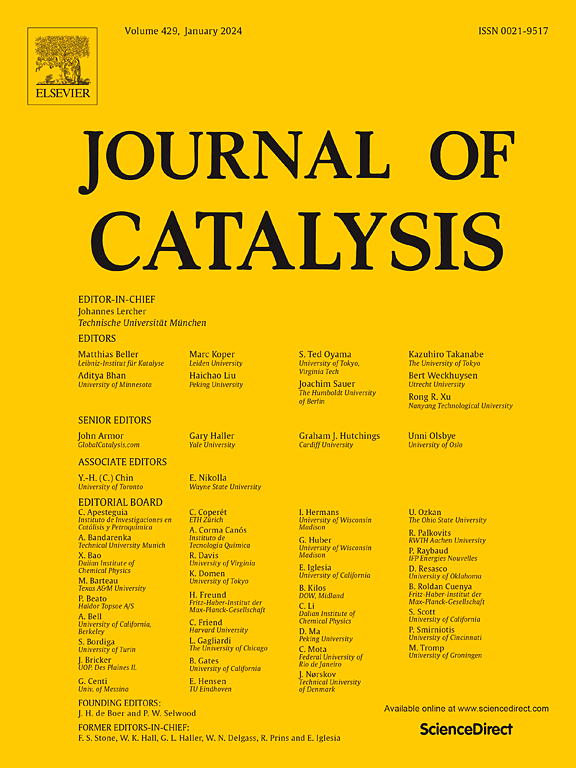用nnn基铁催化剂催化聚酯和聚碳酸酯塑料的高效升级回收
IF 6.5
1区 化学
Q2 CHEMISTRY, PHYSICAL
引用次数: 0
摘要
开发高效、环保的回收方法来减轻聚酯废料对环境的影响仍然是一个重大挑战。本文建立了一种基于nnn基铁钳催化剂的高效催化体系,可通过两种方法促进聚酯塑料的加氢解聚。第一种方法是通过甲醇解聚将聚酯解聚为酯单体,然后在温和条件下以氨硼烷为氢源进行转移加氢,得到二醇产物。第二种方法是利用分子氢作为氢源,对塑料进行直接催化氢解,得到二醇产品。催化剂[Fe(NNHN)Cl2]在降解聚酯和聚碳酸酯塑料中表现出很高的催化效率,包括以日常生活中的塑料废物为原料。本文章由计算机程序翻译,如有差异,请以英文原文为准。


Efficient catalytic upcycling of polyester and polycarbonate plastics using an NNN-based iron catalyst
The development of efficient, eco-friendly recycling methods for mitigating the environmental impact of polyester waste remains a significant challenge. Herein, we establish an efficient catalytic system based on an NNN-based iron pincer catalyst, which can facilitate the hydrogenative depolymerization of polyester plastics using two methods. The first method is to depolymerize the polyester into ester monomers via methanolysis and facilitate subsequent transfer hydrogenation using ammonia borane as a hydrogen source to obtain diol products under mild conditions. The second method is to use molecular hydrogen as a hydrogen source for the direct catalytic hydrogenolysis of the plastic to obtain diol products. The catalyst [Fe(NNHN)Cl2] demonstrates high catalytic efficiency in the degradation of polyester and polycarbonate plastics, including when using plastic waste from daily life as raw materials.
求助全文
通过发布文献求助,成功后即可免费获取论文全文。
去求助
来源期刊

Journal of Catalysis
工程技术-工程:化工
CiteScore
12.30
自引率
5.50%
发文量
447
审稿时长
31 days
期刊介绍:
The Journal of Catalysis publishes scholarly articles on both heterogeneous and homogeneous catalysis, covering a wide range of chemical transformations. These include various types of catalysis, such as those mediated by photons, plasmons, and electrons. The focus of the studies is to understand the relationship between catalytic function and the underlying chemical properties of surfaces and metal complexes.
The articles in the journal offer innovative concepts and explore the synthesis and kinetics of inorganic solids and homogeneous complexes. Furthermore, they discuss spectroscopic techniques for characterizing catalysts, investigate the interaction of probes and reacting species with catalysts, and employ theoretical methods.
The research presented in the journal should have direct relevance to the field of catalytic processes, addressing either fundamental aspects or applications of catalysis.
 求助内容:
求助内容: 应助结果提醒方式:
应助结果提醒方式:


